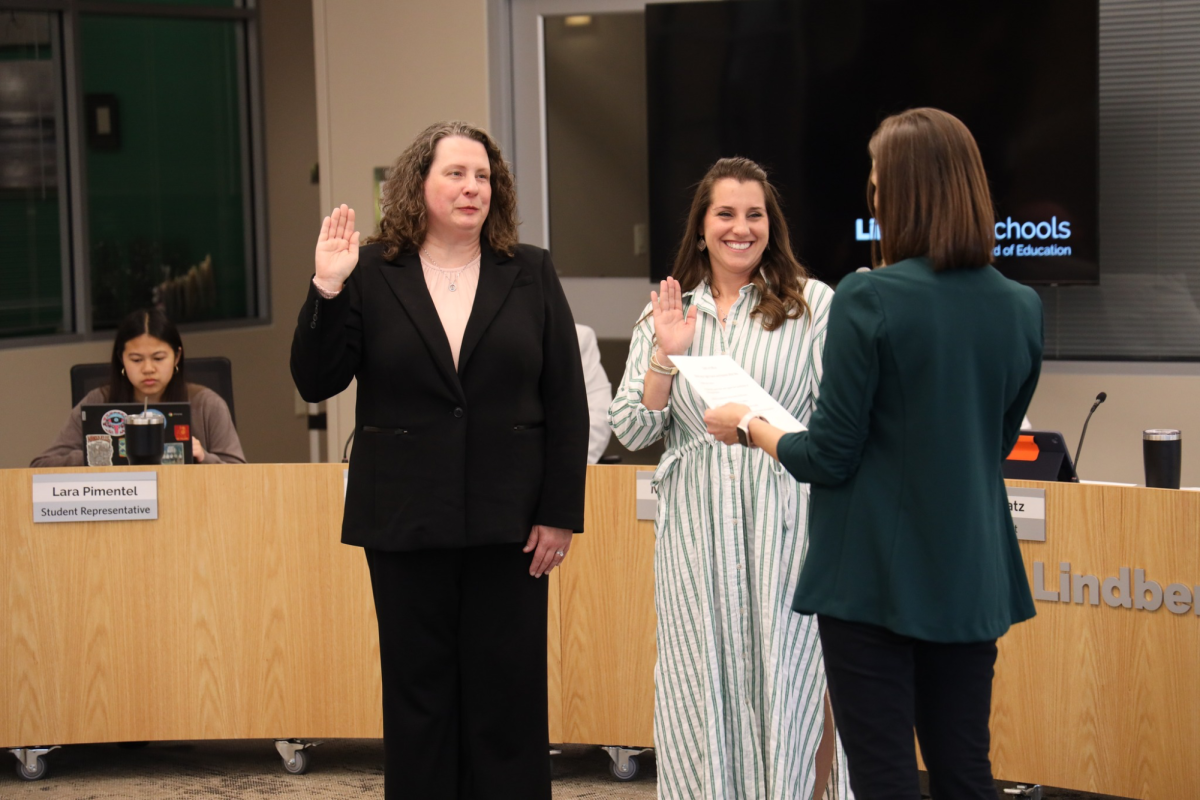The four candidates running for two seats on the Lindbergh Board of Education in the Tuesday, April 2, election expressed similar views last week on what they perceive as the biggest challenges facing the district.
Adam McBride and Cindy McDaniel are challenging board Treasurer Kara Gotsch and board President Vic Lenz for their seats, which carry three-year terms. The candidates responded to questions posed by board Vice President Kathy Kienstra during a March 14 forum that drew roughly 30 people.
Regarding the biggest short- and long-term challenges, Gotsch said, “… In my eyes, they do go hand in hand. I think both short term and long term boils down to financial issues and addressing the influx of students. And it’s something we are going to have to evaluate, come up with different ways to see if some way will work, another way will work and just come up with different plans and ideas, and hopefully come up with some way within our budget that we are able to more fairly compensate our teachers as compared to … the teachers in the other districts.
“But we also need to make sure that our children that are coming in, this huge influx that we are seeing, that they have the proper facilities, that they have the proper education, that they are not causing an increase in the optimal size of our classrooms …”
Lenz said, “… Short term, I think we’re talking about maintaining the teachers’ salary schedule to make the job attractive to keep our teachers that we have and to attract additional teachers as we need them. Long term, it’s also financial and that has to do with having building space for the influx of students that we’re having in the district.
“We have five elementary schools of 500 students. We purchased Dressel (School), but it’s not ready to utilize right now, and we see that building being full within five or so years. So we’ve got to look at where the funds are going to come from to maintain a decent salary schedule and to have the space to put the classes in at the current district-recommended staff size …
“Eventually, we’re going to have to look at doing some kind of an outreach to the community, but that cannot be done until we’ve gone through a lot of work with administration and the board looking at what our possibilities are and working with the community to see what the possibilities are also.”
McDaniel said, “I would agree with the things that already have been said. Certainly, the short-term solutions are addressing the growth and retaining the teachers and ensuring their job satisfaction. And doing so while we manage through with the economic conditions and the funding requirement challenges.”
McBride said, “… Short and long term, I think, go hand in hand. We’ve heard a lot about growth. They’re expecting over 570 new students in the next four years or so, the majority of those at the elementary level … So this is a long-term problem. It’s not going to go away, and I think we should pride ourselves that that many people want to come here, right? That we’re that attractive. One of my pet peeves, my daughter’s in kindergarten, but we still don’t offer free full-day kindergarten. We’re one of, I believe, only two districts left, and I understand there’s a dollar value to that. And I understand that there’s a space problem on that.
“The space problem might be able to be rectified if Dressel ever gets kicked up and running. There might be a way to address it and incorporate it with costs that we’re going to have already. And again, we have a teacher salary issue. My wife’s a school teacher, not in this district, but I know how that pay looks …”
Teaching is more than a 40-hour per week job, McBride said, adding that retaining top teachers is critical to Lindbergh’s success and competitive pay is a factor in that retention.
Lindbergh is experiencing aggressive enrollment growth, and the candidates were asked whether “the district should pursue a future bond issue for constructing the new Dressel Elementary School or find some other means to handle the growth?”
McBride said, “… I don’t know that there is any other option, and unless somebody shows me some fancy new financing method, bonding’s the only way that you traditionally see this (happen) …”
A great deal of work would be required at Dressel, he said, adding, “… That school is either going to have to be razed or reconstructed on the rear of the property to help, because Musick (Road) needs a lot of work, too …
“So, I guess in short, I’m saying yes. I would support that …,” McBride said, adding that if the board is open and honest about the district’s needs, the community will respond.
Gotsch said district officials have been creative in finding ways to fund the purchase of property, noting bond-like certificates were issued to fund the purchase of Dressel School.
“… I don’t know if there’s something like that available for construction-type work, capital improvements versus acquisition of property. If there is, we’ll find it and that’s what we’ll do. If not, we may have to go to the taxpayers for a bond issue …,” she said. “In short, I would hope for some creative-type financing, but if necessary, I think a bond issue could be examined if there was no other way of funding it …”
Lenz said, “… I wouldn’t be ready to say we would renew Dressel School or replace it totally. I think that’s something we need to study and do some workshops with the administration, with engineers, building people that know what can and can’t be done and what it’s going to cost …
“Ultimately, I believe the cost of either replacing or renewing Dressel School is going to be sufficient that we would have to have a bond levy, but that should not be done, again, without working with the community, informing the community, educating the community as far as the need …”
McDaniel said, “Agreed. There’s no simple or magical answer to the growth and the needs of the school district, especially, again, in today’s economic conditions. But just echoing that thoroughly investigating what options are out there, if anything other than a bond issue, it will be uncovered and considered. But we do have to address the growth …”
The consequences of not addressing the growth ultimately could impact academic performance, she said, noting the board must communicate and educate the community “on what the options are, what the needs are and going from there …”
The candidates were asked if they agreed with or would seek to change the Board of Education’s stance on collective bargaining — negotiating salary and benefits, but not school-governance issues.
The four candidates said they would not seek to change the board’s stance on collective bargaining, but would work in a collaborative manner with district teachers.
Of teachers, Lenz said, “… We seek their opinion. We want to hear what they have to say, but the board reserves the final right to make a decision …”
McDaniel said, “I also would not seek to make any significant changes there,” and she agreed with Lenz about listening to teachers and their concerns.
McBride said, “… If it isn’t broke, don’t fix it. It seems to be working, the policy and the procedure that they have here … As long as our ears are open and we’re having constant dialogue and conversations, I think you could probably ultimately achieve or get towards those goals, just by being open, having that open line of communication …”
Gotsch termed the district’s teachers “an invaluable resource,” noting the board consistently has relied on teachers’ input during her tenure.
“… We sit and we listen … And it’s not we listen — we hear … We’re all trying to reach the same goal, and that is to educate our children in the best way possible …,” she said.



















